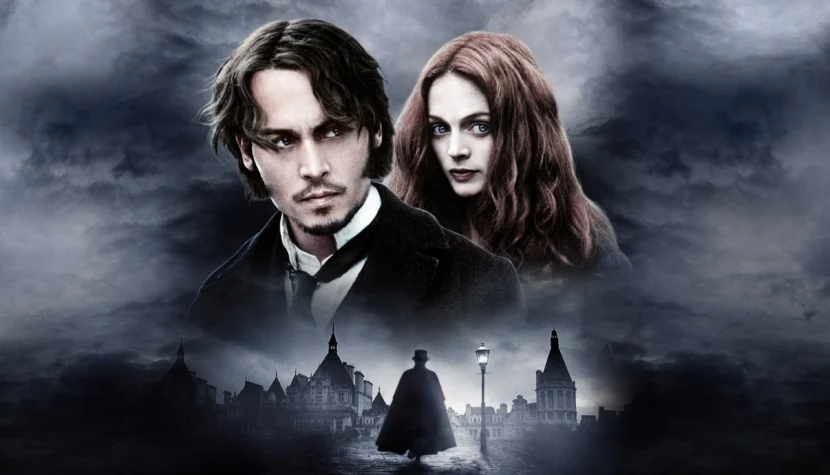FROM HELL. Johnny Depp on the trail of Jack the Ripper

Jack the Ripper – it is hard to imagine a better subject for a filmmaker wanting to create a moody thriller with 19th-century London as a backdrop. One would think that this story tells itself, and all that is needed is not to interfere with it. Nothing could be further from the truth. The Hughes brothers, armed with the available filmmaking techniques, strived to create a metaphysical thriller, a parable devoid of soul. Moreover, in their quest for an explanation of the mystery, they lost the very secret that has accompanied the story of Jack the Ripper since its inception. From Hell indeed.

London, 1888. In the gang-ridden and prostitute-infested district of Whitechapel, an elusive killer begins to stalk the streets. He dispatches his victims in a brutal and merciless manner. His targets are aging, uncared-for prostitutes. The investigation into the murders is assigned to Inspector Abberline (Johnny Depp), who, importantly, comes from the middle class. He is an opium addict and alcoholic, employing investigative methods that were very unusual for the time. Today, he would likely be regarded as a specialist in psychological profiling. However, the information he gathers about the crimes comes not (or not only) from the crime scenes but primarily from his narcotic visions, which often prove to be prophetic. The situation becomes even more complicated when the Ripper begins to hunt a prostitute with whom Abberline has a close relationship.

From Hell is undoubtedly an ideal example of postmodern cinema. Unfortunately, in this case, it provides arguments for the critics of this popular trend. One could say that, in a sense, it embodies the worst aspects of postmodernism: imitation and attempts to cram many ill-defined genres into one, such as crime, romance, psychological thriller, all heavily seasoned with forced metaphysics. The attempt to combine a compelling story with metaphysical elements has been present in cinema since the very beginning, and it is understandable that from time to time, a director reaches for this tested formula. While films like David Fincher’s Se7en or Alan Parker’s Angel Heart successfully apply this approach, in the case of From Hell, it results in a complete failure. So, what can we find in the film?

To begin with, the main character—the inspector—is a drug addict solving criminal cases by drawing clues from his prophetic visions, in which opium plays a significant role. There might not be anything particularly irritating about this if his character didn’t bear an uncanny resemblance to Frank Black, the protagonist of the popular television series, Millennium by Chris Carter. This could also be attributed to references from the classic works of Fox network, but the essence of postmodernism lies in the creative reimagining of the referenced threads. This creative approach to the source material is sorely missing in the Hughes brothers’ film. It would almost seem necessary to send both directors to study under a master of rearrangement, such as Baz Luhrmann.

Another crucial plot point in From Hell—the conspiracy of Freemasons and royalists—feels not only forced to the limits of logic but even verges on stupidity. If you were to ask an average American viewer of this film what the word “mason” means, they would most likely give an answer more related to a popular actor of the time than to the actual definition of the word. The Hughes brothers, taking advantage of this lack of knowledge, present to the viewer an image of a corrupt and rotten upper class, whose sole goal is to maintain a decaying “status quo,” seemingly forgetting (or perhaps not knowing?) that Benjamin Franklin, one of the framers of the American Declaration of Independence, was also a Freemason and aristocrat—an enlightened mind of his era. Moreover, for European viewers who have been frightened for years by the sick visions of Masonic dominance, this approach seems even more absurd.

All of this could be swallowed relatively painlessly, attributed to typical Hollywood simplifications, if the filmmakers hadn’t added a metaphysical thread to the conspiracy. It does not fit into the overall story at all, appearing out of nowhere and causing confusion that further complicates the already tangled plot. The greatest sin, however, which becomes clear with the passage of time since watching the film, is not the form but the very attempt to explain the phenomenon and mystery of Jack the Ripper, a mystery that has never been solved in reality. I must agree with the occasional voices suggesting that it would have been better for the film to leave certain matters to the viewer’s imagination rather than engage in clumsy speculations about the origins or motivations of the alleged killer, culminating, to put it gently, in a conclusion devoid of finesse.

The combination of the aforementioned threads led to the creation of an explosive, hard-to-digest mix, giving the impression that the directors were disregarding the intelligence of the viewers. Neither the solid acting of Johnny Depp, Robbie Coltrane, and Ian Holm nor the obvious references to classics like Lynch’s The Elephant Man (almost repeating the entire scene of John Merrick’s presentation) and Coppola’s Bram Stoker’s Dracula, both set in London almost at the same time (the late 19th century), help. Unfortunately, the negative aspects of From Hell overshadow what deserves the most attention in this film, namely the excellent costumes and decorations, reminiscent of French director Pitof’s Vidocq, as well as the stunning cinematography by Peter Deming (Mulholland Drive), which makes the film at least watchable.

For me, the mystery of Jack the Ripper, a man who, as he himself put it, in some sense gave rise to the 20th century, his motives and the complexities of his distorted psyche, remain unknown. I am still waiting for a cinematic interpretation worthy of the shiver of fear (and disgust) that his figure continues to evoke.

